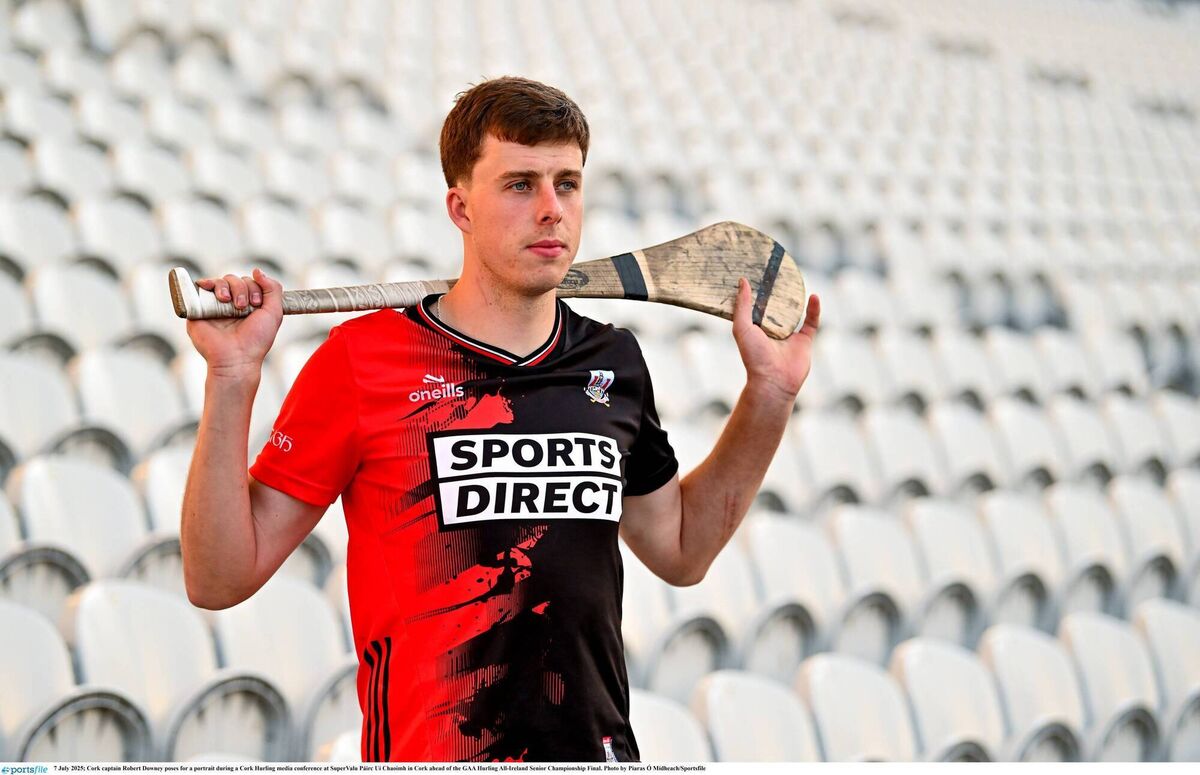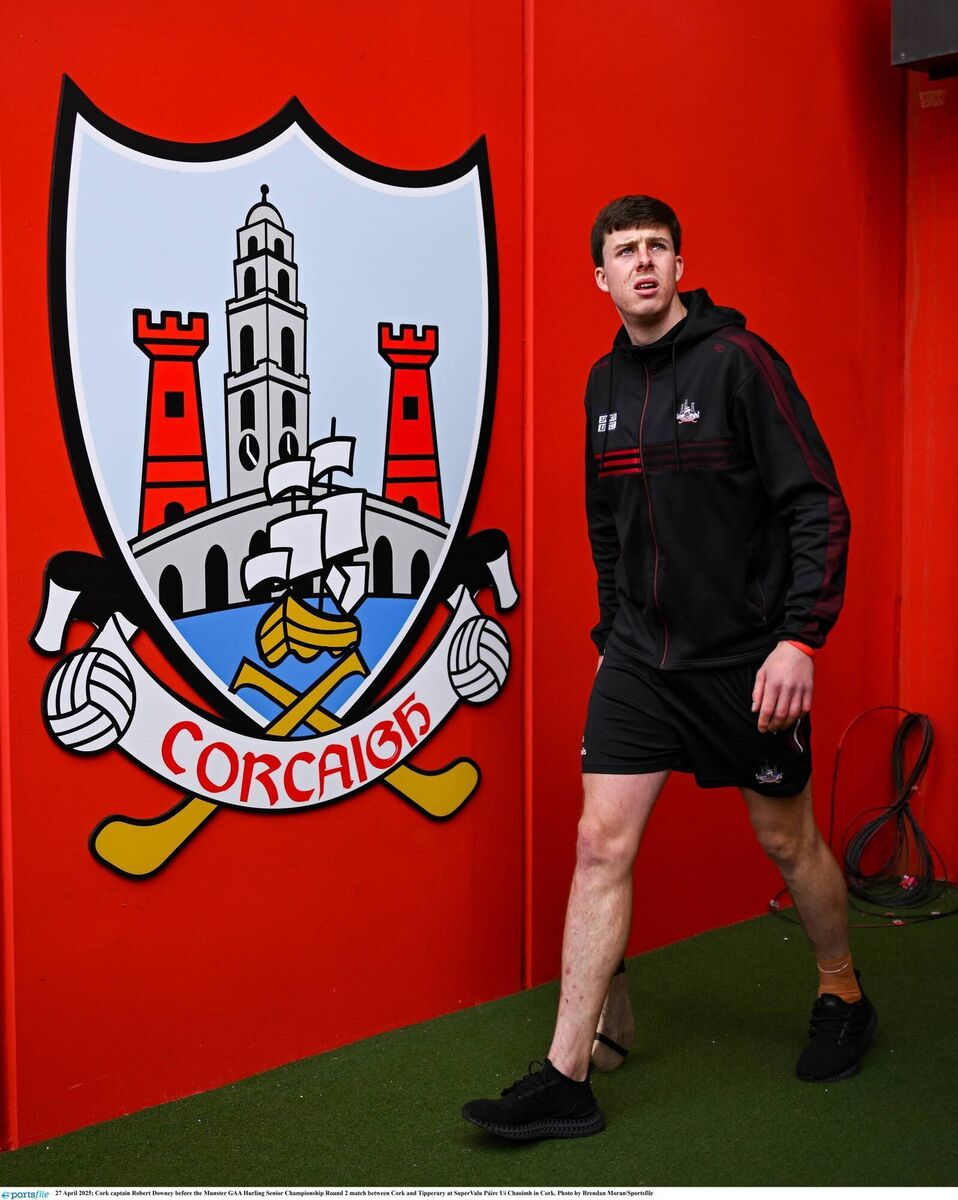Kieran Shannon: Cork captain Robert Downey turns to the Glen for advice, comfort and inspiration

Cork captain Robert Downey poses for a portrait during a Cork Hurling media conference at SuperValu Páirc Uí Chaoimh in Cork ahead of the GAA Hurling All-Ireland Senior Championship Final. Photo by Piaras Ó Mídheach/Sportsfile
WHEN Robert Downey walked down to Páirc Uí Chaoimh after work at Pat Ryan’s request one evening last October and was told that he was Cork captain for 2025, he turned to a familiar source of advice, comfort and inspiration: the Glen.
Almost all his life it has been that way. As a kid there was hardly a day when he wasn’t down at the club field or the indoor ball alley with his friends Ruairi Byrne, Simon Kennefick and Danny Morris with his kid brother Eoin tagging along. Inevitably down there they’d see Patrick Horgan. Cork selector Wayne Sherlock has often mused how that the two Downeys are 'like [Wayne] Rooney, pure street players – you hardly ever see them without a hurley in their hand' – but it’s no mystery given the local deity in their midst.

“Growing up, we were lucky we had such close access to Hoggie,” says Downey. “He’d be around with a hurley in his hand, 24/7.
“The ball alley in the Glen would be bigger than a squash court, so you’d play squash with your hurleys and sliotars there: just one touch, two bounces, with a line at the top wall that you had to hit over.
“We’d be in the viewing area, at 13 or 14, watching him for hours and hours in there with lads from the senior team. And then he’d call us in for the last two or three games. It gave us the bug to want to get to the level he was at and to practise as hard as he did.”
Did he ever beat Horgan? Yes, he smiles, several times, including when he was still in his mid-teens. “In fairness though,” Downey quickly adds, “he is still probably the best of us. Because it’s funny, even in the offseason we’ll still play. I could ring him or he could ring me and a few of us will head to the alley again. We always find ourselves back there.”
Downey also tends to find himself back in the clubhouse most Friday evenings, not just to meet his old and best friend Byrne, but Byrne’s father, Mick, who’d have coached them underage, and Byrne’s close friend, Diarmuid O’Donovan.
O’Donovan is both steeped in GAA history – his father Donie coached the 1973 All Ireland winning football team while he himself coached Cork minor teams to Munster titles – and a student of GAA history; he was a researcher on the recent and magnificent Hell for Leather series and has a masters for a thesis he wrote on the history of the GAA on the northside of Cork city.
Most people or players of Downey’s age aren’t inclined to meet up weekly with old-timers talking about old times. Downey is not most people or players. Instead of being bored or burdened by his club’s past, he is intrigued and inspired by it.
“When you grow up in the Glen, it’s impressed upon you from an early age that you’re lucky to be putting on a Glen jersey,” says Downey. “It’s special. And you come to appreciate that there have been great fellas that have gone before us and what they have done and the success they brought to the club. So I’d big into hearing all the stories and learning more about the club’s characters and success.”
A couple of months ago so when his commitments with Cork meant he couldn’t attend O’Donovan’s public talk on Dr Jim Young, Downey the following Friday in the clubhouse wanted a full recap on this remarkable individual who came from the football stronghold of Dunmanway and ended up via Farranferris and UCC winning five hurling All Irelands with Cork and nine counties with Glen Rovers.
Last October though when Downey emerged from his meeting with Ryan, it was a more recent Glen and Cork captain that Downey looked towards as a model. The same day that Downey had scored 1-2 in a rare year playing at full-forward to help the Cork minors win the 2017 Munster title in Thurles, Stephen McDonnell lifted the senior trophy for Cork.
“You ask any of the lads in here with Cork who played with him, Maccie was an incredible leader, one of the best captains they ever played under,” says Downey. “He had an enormous self-confidence, and in the big games almost always performed. He didn’t get half the credit for being as good a player as he was. So after I spoke to Pat, I’d have spoken to Stephen.”
McDonnell only delighted to hear from him. Like Horgan, he’d regularly use of the Glen ball alley when he was playing for Cork and would occasionally invite Downey to join in with him. When Downey turned 17, McDonnell welcomed him into the Glen senior dressing room. McDonnell’s last year with Cork was Downey’s’ first.
“The biggest thing about Robbie is his character,” says McDonnell. “First of all, he was reared very well by his mother and father, Angela and Paul. He’s courteous, respectful; if he meets you, he’ll ask your name, then drop it throughout the conversation.
“Second, he’s from the northside. You’re walking down to the Glen, you’ll come across people trying to rob your hurley so you’ve to fend your way, hold your own, have your wits about you.
“Married with that then he went to Christians where it’s diverse, global; he’d have got a good education.
“And then there’s the Glen with its values of hard work. Team first. No bullshit. Not waiting for other people to do it, you do it. Keep going, keep learning.”
McDonnell and others in the Glen will tell you: Downey’s vintage suffered their share of hammerings coming up the ranks. At U14 they were drilled for eight goals by Douglas. Yet their mentors – Tony Wall who also coached him in Christians, Mark Kennefick, his future Friday night companion Mick Byrne, along with Peter and Richie Kelleher – kept the faith and convinced them not to lose theirs. And they didn’t. Downey and his gang would still be down in the club every evening they weren’t behind the goals in Páirc Uí Rinn snapping up any stray, wayward sliotars. At minor they beat Douglas on their way to winning the county.
“The thing I said to Robbie was that you’ll hear stuff like as captain you’ve to always be playing well, you’ve to be the first at training. That’s all fine but the reality is your captain needs to play well in the big games. Everything else doesn’t matter. You can play bad in a league game, even an early round-robin game. When it comes to the big, big games there should be no question that your captain is going to stand up in those moments. And Robbie has that about him. That’s why he was chosen as captain. When the chips are down he has the character as well as talent to stand up and doesn’t wait around for other people to do it.
“He just needed to remember that and not shy away from it. As a captain you can put a lot of pressure on yourself. I have to be the best player every day, I have to be the first at training, last to leave. It’s all 'have to, have to, have to'. Just go out and enjoy it. There will be times early in the season when you don’t play well. Just keep going. The big games will come along and that’s when you will come to life and lead the team.”
That has been his way. At 6’7”, Downey is as tall and commanding a figure as there is in hurling but he plays even bigger on the big days. Last year he scored possibly the finest individual goal scored in an All-Ireland final by a player from the losing team; only Tony Kelly’s wonder goal, or Clare’s eventual triumph, eclipsed it.
This season has been disjointed by a series of knocks and niggles he endured since the league final, but it’s no coincidence that Cork’s defence has been at its meanest and best when he’s been physically close to his optimum self. For illustration contrast the 16-point defeat against Limerick when, by his own admission, “I shouldn’t have played, looking back – I’d torn my hamstring in training”, to his introduction in the Munster final.
“Since he came back in that day he’s been tremendous,” says selector Wayne Sherlock. “Just the way he plays – making a big catch, going forward with the ball, breaking tackles – it rises the crowd. Fellas react to him, feed off him. Certain players do certain things that drive the whole thing and he’s one of them.”
His Friday evening personal historian O’Donovan has also sensed that natural authority. “I went to school with Donal Lenihan and Robert has that same presence and command. His word is law.”
McDonnell has a preference for action over words. To him what makes Downey is how he plays between the white lines, especially at centre back.
“Rob can cover a lot of ground, get across and cut out a lot of ball. You could be in the fullback line, marking your man, a ball is being played across and all of a sudden Robbie will come out of nowhere.” But McDonnell also knows the importance of words and a team’s leaders being prepared to be vocal.

“Robbie would have had great respect for the guys that had been in the dressing room for years: the likes of myself, Brian Moylan. But after a few years we’d have said to him that he needed to be less reserved because of his standing within the group. ‘We need you to be more vocal.’ I was trying to step back more and Robbie was one of the lads best placed to fill the void, so I’d have said to him, ‘Robbie, you need to fill that space because if you don’t someone else will when you’ve the most important voice here.’
“And he did. He has a good balance of being very direct and demanding and also being supportive and putting an arm over a fella’s shoulder.”
Downey’s not all hurling. He’s not all serious. McDonnell can vouch that he’s not only good for a laugh but also a song, especially of the rebel variety.
He’s partial to a game of snooker, the sport his father mostly played, and before games with Cork will go pot some shots with the likes of Patrick Horgan, his brother Eoin and Brian Hayes or his old mates in the Glen.
Professionally, he’s ambitious. After studying economics and geography for his primary degree in UCC, he did a masters in management and marketing and now works as an analyst for the financial services company Clearstream.
His passion though remains the club, or should we say the clubs. “If someone asks me what club you play for,” says Downey, “I tell them the Glen and St Nick’s [St Nicholas’]. To me when you join the Glen you’re also joining St Nick’s. Nick’s has a huge tradition as well that I’m very aware and proud of.”
He can tell you for instance that they were the first Cork team to win the Munster football club championship. These days they’re well off that, operating in the premier junior grade, yet next month, Downey, along with Eoin, will suit up for them, even though he will be coming off his seventh season with the county senior hurlers. It’s a game they enjoys and there’s a tradition to uphold.
“If you go through the best players to play for the Glen, they all played football too,” he reminds you. “Denis Coughlan. Martin O’Doherty. [Jack] Lynch obviously. Even Ring.”
They put their shoulders to the wheel for the Glen too. Last May the Glen played a home league game against Blackrock while Cork were still in the championship; doing the posts at one end was Robert, at the other end signalling if it was a point or a wide was Eoin.
For them it wasn’t a bother. They were going to be there anyway. When Cork aren’t training or playing, there’s nowhere else they’d want to be, just like Hoggie.
This weekend, though, the three of them will be in Dublin, just as they were the weekend before last as well. “Getting onto the bus the last day Hoggie was laughing,” Downey recalls. “I won’t call him old but he’s the oldest on the team and he knew: these days don’t come around too often. We were all a bit giddy driving in.”
Downey wasn’t even six when Seán Óg Ó hAilpín lifted Cork’s last All Ireland; he was born in the fortnight between Ó hAilpín winning the 1999 All-Ireland hurling final and then losing the football. “I watched that 2005 final in the backroom of the house with my dad. I’ve only a very vague memory of it because I was so young but I can just remember my dad jumping around, delighted.”
From his Friday evening chats with O’Donovan and a lifetime immersed in his club though, he is aware and appreciative of those who came well before him and brought Liam MacCarthy back to the banks and the Glen.
Tomás Mul. Martin O’Doherty. Connie Buckley. Lynch. Ring.
They’re not giants who weigh heavily on his shoulders.
To him they’re giants whose shoulders he’s comfortable and honoured to stand on.



